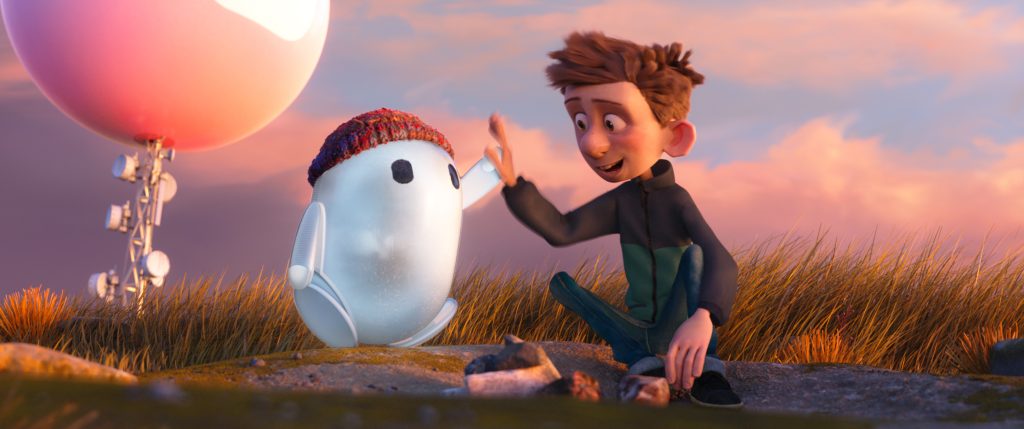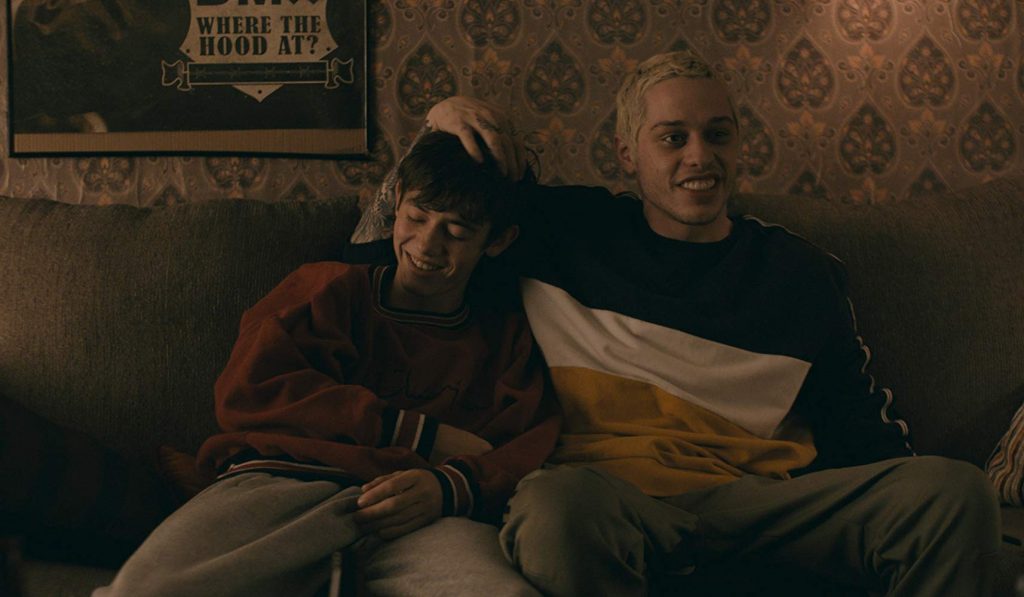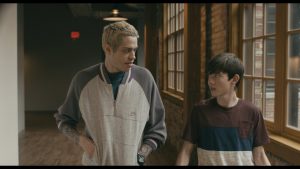October 22, 2021
by Carla Hay

Directed by Sarah Smith and Jean-Philippe Vine
Culture Representation: Taking place in an unnamed U.S. city, the ainmated film ‘”Ron’s Gone Wrong” features a predominantly white cast of characters cast (with some African Americans and Asians) representing the working-class, middle-class and wealthy.
Culture Clash: A lonely adolescent boy gets a companion robot as a gift, and he finds out that the robot has flaws that can get him into trouble.
Culture Audience: “Ron’s Gone Wrong” is a family-friendly film that will appeal primarily to people who like stories about how contemporary and futuristic technology could affect humanity.

Can an imperfect computer-operated robot be the perfect best friend for a lonely boy? That’s the question behind the animated comedy adventure film “Ron’s Gone Wrong,” which has some quirks and flaws (just like the robot in question) but is ultimately charming in how it presents issues about how much technology can or should replace a human being. “Ron’s Gone Wrong” gets a little off-track in the last third of the film by trying to cram in too many twists and turns to the story, but it eventually gets back on track to have a satisfying conclusion.
Directed by Sarah Smith and Jean-Philippe Vine (with co-direction by Octavio E. Rodriguez), “Ron’s Gone Wrong” treads on familiar territory in children’s oriented films where the protagonaist is a lonesome child who finds and befriends a “special companion.” The “special companion” is unusual enough that, at some point, the child has to keep the companion a secret from adults who might want to take the companion away from the child. The “special companion” could be a talking animal (“Ratatouille”), a space alien (“Lilo & Stitch”) or a computer-operated robot (“Ron’s Gone Wrong”).
“Ron’s Gone Wrong” might gets some comparisons to the Oscar-winning 2014 animated film “Big Hero 6.” However, that there aren’t many things that these two movies have in common except that they’re both animated films about an adolescent boy who has a computer-operated robot as a best friend. In “Big Hero 6,” the boy and the robot are crime-fighting superheroes. In “Ron’s Gone Wrong” the protagonist and his companion robot are supposed to be awkward misfits who have more misadventures than adventures.
The central human character in “Ron’s Gone Wrong” is an adolescent boy named Barney Pudowski (voiced by Jack Dylan Grazer), who is a seventh grader at Nonsuch Middle School, which is an unnamed U.S. city. Barney doesn’t have any close friends or siblings. And he’s the only student who doesn’t have the world’s hottest technology device: a Bubble Bot, also known as a B-Bot.
A B-Bot is a talking robot that is shaped like a giant pill capsule and is about the size of a toddler child. Every single B-Bot has a computer algorithm that can detect from a person’s handprints what that person’s preferences and memories are, in order to make the B-Bot the perfect, custom-made friend to the person who owns the B-Bot. The B-Bots come in a box that has this label: “Best Friend Out of the Box.”
B-Bots have become such a common technology device, kids at school have a special location where the B-Bots are stored while the school’s classes are in session. The B-Bots are allowed to interact with the kids at school outside of the classroom, such as in hallways, in cafeterias, or during recess periods. Just like smartphones, B-Bots have become significant in the lifestyles of people who can afford to have this technology. Anyone who doesn’t have a B-Bot at Nonsuch Middle School is considered a social outsider and “behind the times.”
B-Bots were invented by a computer tech genius named Marc Widdell (voiced by Justice Smith), who is the CEO of the Bubble company that makes B-Bots. The beginning of “Ron’s Gone Wrong” shows Marc introducing B-Bots at a big event that’s similar to Apple Inc.’s product-reveal events. Marc’s goal to have the world populated with B-Bots is not motivated by greed but rather by an altruistic intention to rid the world of loneliness. B-Bots are programmed to not hurt people and other beings.
Marc has a second-in-command executive named Andrew (voiced by Rob Delaney), who’s in charge of the company’s sales and marketing. Andrew is selfish, dishonest and ruthlessly ambitious. He doesn’t really care if B-Bots are helping people or not. He just wants to sell as many B-Bots as possible, because he eventually wants to take over the company and replace Marc as CEO.
Meanwhile, at school. Barney is teased and bullied by other students because most of his toys are rocks. A compassionate teacher named Miss Thomas (voiced by Megan Maczko) hugs him in the schoolyard (much to Barney’s embarrassment) and tells some of the students to talk to Barney. It just makes things worse, because the students just taunt him some more about not having a B-Bot. They call Barney names like “rock boy.” Barney also feels different from most other students because he has asthma.
The chief bully is a brat named Rich (voiced by Ricardo Hurtado), who is merciless in trying to insult and humiliate Barney. Rich has two sidekicks named Alex (voiced by Marcus Scribner) and Jayden (voiced by Thomas Barbusca), who go along with whatever Rich does. Other students who end up interacting with Barney are Savannah (voiced by Kylie Cantrall), a self-centered gossip who’s obsessed with being a social media star; Noah (voiced by Cullen McCarthy), a nice guy who is kind to Barney; and Ava (voiced by Ava Morse), a brainy and empathetic acquaintance who is Barney’s secret crush.
Barney lives with his widower father Graham Pudowski (voiced by Ed Helms) and Graham’s Russian immigrant mother Donka Pudowski (voiced by Olivia Colman), who is a widow. Barney’s mother/Graham’s wife died when Barney was 2 years old. Graham owns a novelty toy and trinket company called Pudowski Novelty Exports, which is an online wholesaler. Graham works from home and does all the sales himself, which means that he works very long hours. He’s often seen on the phone trying to close deals with potential and existing clients.
Donka is old-fashioned and scatter-brained, but she adores her family. She likes to think that she’s still living on a farm in Russia instead of a city in the United States. How old-fashioned is Donda? She will bring live animals, like a chicken or a goat, with her wherever she goes.
It’s somewhat of a corny and outdated depiction of immigrants who come to America, by stereotyping immigrants as people stuck in the backwards ways of the “old country” that’s not as technologically advanced as the United States. And in other stereotype of immigrants who don’t have English as their first language, Donda speaks in broken English.
Barney likes to play with toy trains, but even that’s considered out-of-touch by his peers. He longs to have his own B-Bot. However, Barney’s loving but strict father doesn’t want Barney to have a B-Bot because he’s concerned that Barney will be like other kids who spend too much time being addicted to technology and devices, instead of having in-person human interactions and doing things like playing outdoors. Ironically, Graham has become such a workaholic who’s glued to his phone and his computer, he’s been neglecting Barney.
As for Barney’s grandmother Donda, she doesn’t trust new technology overall. Donda doesn’t mince words when she tells Barney what she thinks about B-Bots: “B-Bot is just a fad. And it costs a fortune!”
Early on in the movie, Barney turns 13 years old. His father and grandmother have a birthday party for Barney. The people who were invited to the party were some Barney’s fellow students, but none of the invited people goes to the party. Barney is also disappointed when he opens the birthday gift that he got from his father: It’s another rock toy.
Graham, who can see how miserable Barney is, feels guilty about not getting Barney the gift that Barney wanted. And so, Graham and Donda go to the nearest store that sells B-Bots to get a B-Bot as a belated birthday gift for Barney. But there’s a big problem: All B-Bots are sold-out and won’t be available for the next three months.
Just by coincidence, as Graham and Donda are leaving the store, they see some delivery truck workers in the back of the store. Graham overhears one of the workers talking about a defective B-Bot that Graham can see in the back of a truck. And the next thing you know, Barney gets a belated birthday girft. He opens up the box, and it’s the defective B-Bot, but Barney doesn’t know yet that the B-Bot is faulty. Graham has presented it as a new B-Bot.
It doesn’t take long for Barney to find out that the B-Bot has a lot of glitches. In one of many mistakes, the B-Bot (voiced by Zach Galifianakis) misidentifies Barney’s name and has programmed itself to think that Barney’s name is Absalom. One day, when Barney comes home, he finds out that the B-Bot has made his room a mess and even set a few things on fire. It’s the opposite of the helpful housecleaning duties that a B-Bot is supposed to be capable of doing.
Barney takes an instant dislike to this B-Bot and doesn’t want anything to do with it. However, the B-Bot is programmed to try to be the best friend possible to its owner. The B-Bot tags along with an annoyed Barney, who hasn’t bothered to give the B-Bot a name.
One day, school bully Rich corners Barney for some more insults and degradation at an outdoor skate park, where Rich has been showing off his skateboarding skills during a livestream for his social media. Alex and Jayden are there too. Rich thinks that harassing Barney during the livestream is hilarious.
Rich also makes fun of Barney for having a defective B-Bot. Rich hits the B-Bot, but he’s in for a shock when the B-Bot hits back. A brawl then ensues between Rich and the B-Bot. Rich’s cronies run away in fear, while Rich shouts, “Cut the livestream!”
But the damage has been done. People who saw the livestream now know that a B-Bot is capable of attacking humans. Barney later finds out that his B-Bot doesn’t have “safety settings” to prevent it from hurting people. And that’s why, to avoid a potential PR disaster and lawsuits, the Bubble company orders that the B-Bot be found, confiscated and destroyed. The police also get involved in the search.
However, Barney is impressed with how this B-Bot defended him like a friend. Barney now doesn’t want to give up his B-Bot. He tells the B-Bot, “I can fix you and teach you to be my friend.” It’s at this point that the B-Bot says his name is Ronbitscasco, but Barney calls the robot Ron, for short.
There’s a great deal of the movie that’s about Barney trying to hide Ron from people who want to take Ron away from Barney. Varous hijinks happen—some more predictable than others. Meanwhile, Ron causes a lot of mishaps along the way, which makes Barney get into even more trouble. Barney than does the most obvious thing that a kid would do who wants to hide.
“Ron’s Gone Wrong” might get some criticism for how the problems in this story are resolved. However, it’s easy to perhaps misinterpet “Ron’s Gone Wrong” as a movie that advocates for replacing human interaction and human emotions with the idea that a computer-operated robot can take care of all of a person’s needs. Instead, the message of the movie, which can be a bit muddled, is that there are certain technologies that aren’t going away anytime soon. We can either be in misguided denial and think that people will stop using this technology, or we choose to figure out ways how that technology can beneift people in a positive way.
The movie makes a point that technology, just like anything else, can be abused and used for the wrong reasons. Andrew is the obvious villain who is the epitome of this misuse. Barney knows that Ron should not be his only friend, but Ron teaches Barney to have the self-confidence to make human friends. And the movie doesn’t put all the blame on technology-obsessed kids, because there’s a part of the story that deals with how adults can unintentionally be neglectful of their children for reasons that have nothing to do with technology.
“Ron’s Gone Wrong” is a children’s oriented movie that slips some borderline adult jokes into the story, so that adult viewers can get some laughs. In one scene, Donda says that she once “mended my own hernia with a bread knife and vodka.” In other scene, there’s a recurring poop joke that becomes a plot device for something that happens to one of the students at Barney’s school. The joke might be offensive to some viewers, so consider yourself warned.
At times, “Ron’s Gone Wrong” goes a little bit too over-the-top with what these B-Bots can do. Without giving away any spoiler information, it’s enough to say that parts of this movie look inspired by the “Transformers” cartoon series. Fortunately, the movie doesn’t go off too much on this tangent. “Ron’s Gone Wrong” has some eye-catching visuals, and the cast members perform their roles well. It’s not in the upper echelon of top-quality animated films, but “Ron’s Gone Wrong” serves its purpose of being escapist entertainment that people of many generations can enjoy.
20th Century Studios released “Ron’s Gone Wrong” in U.S. cinemas on October 22, 2021.


